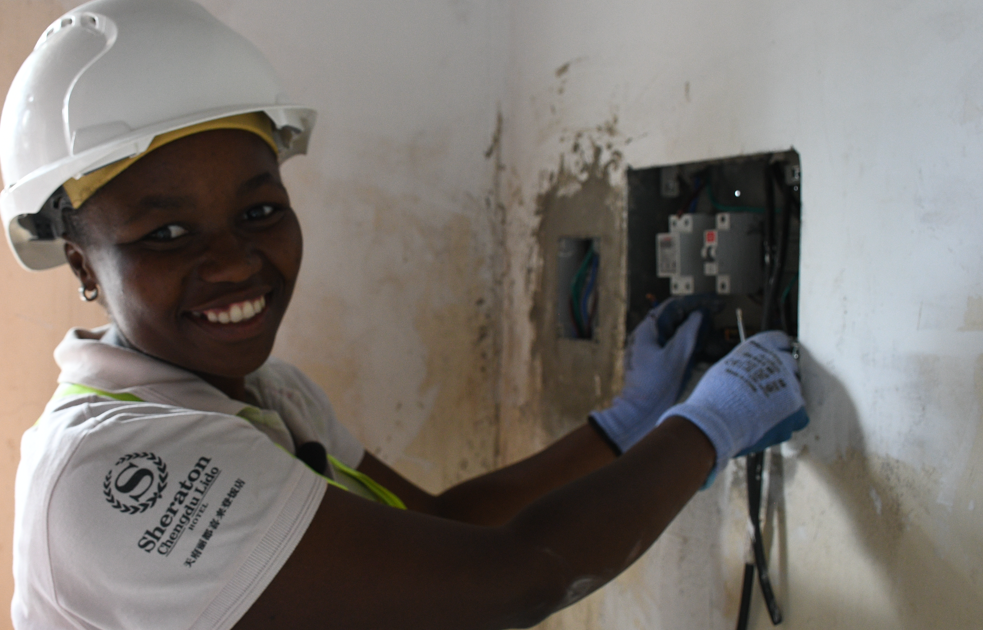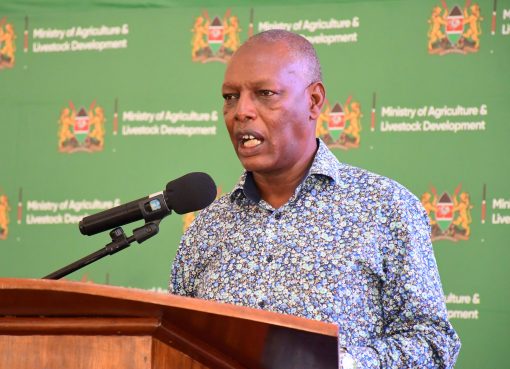Shrinking job markets has thrown an innumerable number of unskilled youth into a state of despair.
According to a 2022 report by the Education Commission and UNICEF, three out of four young people aged 15 to 24 in 92 countries do not have the skills needed for employment.
When the world marked World Youth Skills Day on July 15, 2023, the UN Secretary-General Antonio Guterres said, “Equipping young people with quality education, training and skills is essential. This World Youth Skills Day reminds us that teachers stand at the forefront of this great global effort.”
Naomi Wanjiku, 28, lives in Donholm, Nairobi. She is a beneficiary of a “great global effort,” carried out by volunteer teachers
She was formally trained at Thika Technical Training Institute, where she earned a diploma in electronics and electrical engineering.
The Kenya National Bureau of Statistics (KNBS) Quarterly Labour Force Report covering October–December 2022 shows that 3.5 million, or a fifth of the 18 million youths between 15-34 years were not in employment, education or training.
What Wanjiku studied entails practical skills. She secured a job as an electrician for a company that manufactures switches and sockets.
“When I was young, I enjoyed working with my hands,” she narrates. “Most of the time I would help my dad to fix electricity and plumbing,” she added.
She loved following her father as he worked. Consequently, her interest in working with her hands were nurtured. Her eyes were focused on a vocational course. She doesn’t regret about it. She allowed a desire to venture into some volunteer work to grow in her heart. “I work secularly from Monday to Friday but on Saturdays and public holidays, I volunteer for Kingdom Hall construction projects,” she explains.
She assists in projects near her. For five months, she has been at the Kingdom Hall of Jehovah’s Witnesses in Inner Core, Umoja. She has been at the core of the major renovation that has been going on.
“In Kingdom Hall construction projects, we are always ready to do any job we are assigned,” Wanjiku says. “I am fully engaged in electrical work in Kingdom Halls. This includes wiring and installation of any electrical appliances.”

Robert Chenje is one of the supervisors at the site. He is a member of the Local Design Construction (LDC) group.
He says, “The renovation works include stripping off the roof and replacing it, fitting the ceiling, tiling the floor, construction of a new washroom block and landscaping among others.”
Men and women of diverse ages at the site have been sweating it out excavating, carting soils away, and performing many more jobs characteristic of a construction site. The women do not grumble.
On average, there are about five more women than men whenever work is going on. All cooperate in working together harmoniously. The scene has almost the semblance of East Africa. Kenya, Uganda, Rwanda and the Democratic Republic of Congo are represented.
The spokesman of Jehovah’s Witnesses in Kenya, Victor Karoki, places the number of such projects in the country going on at any time at 20.
He explains that every Kingdom Hall has a programme and schedule of maintenance. Each hall is evaluated every two or three years to determine whether the building is in good condition.
“After that, a recommendation is given to improve the condition of the building to either make general repairs or major renovations,” he says. Alternatively, a new building may be brought up altogether.
A multi-skilled workforce is much sought after in many career paths. Wanjiku is not lagging.
What she could not learn formally in college, she is learning on the job. Her teachers are her fellow volunteers. These instructors have been instilling in her more practical expertise. “I have been trained in other skills like masonry, painting, tiling, and other construction jobs,” she says. She contrasts her volunteer work location with some elsewhere, “Even when I am not experienced in some work, I am assisted and trained on how to handle tasks,” she states. “This is different from other secular construction projects where women may be looked down upon.
Computer-aided design is another strength she possesses. It entails drawing plans of Kingdom Halls. Before she embarks on a project, she carefully plans. If it is a new project, we first consider how many people will be using the building,” she says.
As one enters the precincts of the Kingdom Hall, safety signs are conspicuously welcoming.
Wanjiku reads and adheres to safety instructions to avoid injuring herself and others. Helmets, boots, gloves, reflectors and masks, depending on the task at hand are easily noticeable.
Another supervisor at the site, Daniel Nyakaana, from Uganda, explains why the roof of the Kingdom Hall had to be stripped off and quoted, “It had caved in a bit. We had to replace it first before continuing with other tasks.”
This was particularly critical since rains threatened to disrupt progress. “We decided to set daily and weekly targets to move faster,” he said.
The weeks in March leading to March 24 have been momentous for Jehovah’s Witnesses all over the world. They have been sharing in a global campaign to invite their neighbours to join them in commemorating the death of Jesus Christ.
“The event will be held at local Kingdom Halls on Sunday, March 24 2024, at sundown,” says Karoki.
For the Kingdom Hall in Umoja, “there’s the desire to prepare it to be fit and proper for this important occasion,” he says.
There are over 118, 000 congregations of Jehovah’s Witnesses in 239 lands around the world. In 2023, the Worldwide Memorial Attendance was more than 20,000, 000. In Kenya, it was more than 70, 000.
Wanjiku is hoping that the renovations that she’s been part of will usher in a renewed phase of the building with a fresh look.
“I’m being used in the best way possible,” she concludes.
By William Inganga





